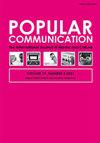The production of knowledge through religious and social media infrastructure: world making practices among Brazilian Pentecostals
IF 1.8
Q2 COMMUNICATION
引用次数: 1
Abstract
ABSTRACT Following Robertson’s discussions on epistemic capital, the article analyses worldmaking procedures being used by members of one of the biggest neo-Pentecostal churches in Brazil – Igreja Universal do Reino de Deus. According to the popular narrative, social media, especially WhatsApp groups, contributed in a crucial way to the spread of sets of conspiracy theories aimed to question “established narratives” and creating an image of Jair Bolsonaro, currently the president of Brazil, as the sole hero (“the messiah” and “the myth”) fighting against the “corrupted” Brazilian state and the “globalist/communist cabal.” The article discusses interactions between members of so-called families created by the Igreja Universal do Reino de Deus. These families could have between a few or around one hundred members, and they are in regular communication (at least a few times per day) through WhatsApp. Most members of one family do not live in walking proximity; therefore, using WhatsApp is often the primary way they interact. The article puts families into a broader context of the media ecosystem owned or influenced by Igreja Universal do Reino de Deus and contextualizes the church as a religious “infrastructure of knowing.” The article discusses sources of legitimization of particular knowledge produced and mediated between families. The article argues that communication in families contributes to the creation of unique epistemic tools crucial in re-creating individual worldviews of members Igreja Universal do Reino de Deus.通过宗教和社会媒体基础设施生产知识:巴西五旬节派的世界制造实践
摘要继Robertson对认识资本的讨论之后,本文分析了巴西最大的新五旬节教会之一——Igreja Universal do Reino de Deus的成员正在使用的世界创造程序。根据流行的说法,社交媒体,尤其是WhatsApp群组,在一系列阴谋论的传播中起到了至关重要的作用,这些阴谋论旨在质疑“既定叙事”,并塑造了现任巴西总统贾伊尔·博索纳罗的形象,作为唯一的英雄(“弥赛亚”和“神话”)与“腐败的”巴西国家和“全球主义/共产主义阴谋集团”作斗争。文章讨论了Igreja Universal do Reino de Deus创建的所谓家庭成员之间的互动。这些家庭可能有几个或大约一百名成员,他们通过WhatsApp进行定期沟通(每天至少几次)。一个家庭的大多数成员并不住在步行附近;因此,使用WhatsApp通常是他们互动的主要方式。这篇文章将家庭置于Igreja Universal do Reino de Deus拥有或影响的媒体生态系统的更广泛背景中,并将教会视为宗教“认知基础设施”。文章讨论了家庭之间产生和调解的特定知识合法化的来源。这篇文章认为,家庭中的沟通有助于创造独特的认识工具,这对重建Igreja Universal do Reino de Deus成员的个人世界观至关重要。
本文章由计算机程序翻译,如有差异,请以英文原文为准。
求助全文
约1分钟内获得全文
求助全文

 求助内容:
求助内容: 应助结果提醒方式:
应助结果提醒方式:


